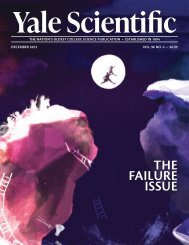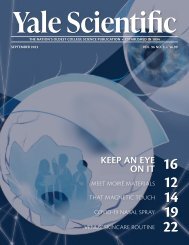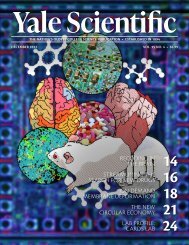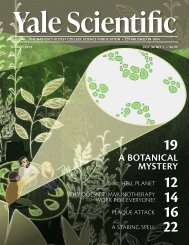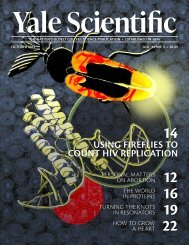YSM Issue 94.3
Create successful ePaper yourself
Turn your PDF publications into a flip-book with our unique Google optimized e-Paper software.
NEWS
Environmental Studies
PERCEPTIONS OF
“NATURAL GAS”
THE INFLUENCE OF TERMINOLOGY AND
POLITICAL AFFILIATION
BY JAMES LICATO
IMAGE COURTESY OF FLICKR
Natural gas continues to be one of the most popular
energy sources across the world. The largest
component of natural gas is methane, a potent
greenhouse gas with twenty-five times the global warming
potential of carbon dioxide. Mining natural gas also results
in leaks that pollute the Earth’s atmosphere. However, the
American public perceives natural gas and renewable energy
sources, like wind and solar, similarly. This discrepancy
motivated Karine Lacroix and researchers from the Yale
Program on Climate Change Communication to study
the American public’s perception of natural gas based
on differing terminology, as well as the effect of political
affiliation on perception.
The researchers asked over three-thousand volunteers to take
a survey that questioned their perceptions of one of six energyrelated
terms: natural gas, methane gas, natural methane gas,
methane, fracked gas, and fossil gas. The team chose the terms
based on their prevalence in media and everyday conversation.
Lacroix and her team found that the term “natural gas”
was perceived most positively by a significant margin. Their
findings also suggest that there is a general lack of knowledge
about the ramifications of using natural gas. Partisanship
also affected term perception, with Republicans holding
more positive perceptions than Democrats.
Public opinion is an important driver for policy initiatives.
To more accurately portray the downsides of natural gas in
the public sphere, “climate communicators should refer to
[natural gas] as methane gas,” Lacroix explained. Lacroix
and her team look to continue their work in climate change
communication as greenhouse gas emissions rise. ■
TRACKING
MERCURY
POLLUTION
RIVERS ARE THE LARGEST CONTRIBUTOR TO
COASTAL OCEAN MERCURY POLLUTION
BY JESSICA LIU
IMAGE COURTESY OF WIKIMEDIA COMMONS
Seafood is tasty, but we are often hesitant to consume
it because of the ocean’s high mercury concentration.
Increased human activities have released mercury
into nearby rivers, where it naturally transforms to
methylmercury, a potent neurotoxin associated with lowered
intelligence, child developmental delays, and cardiovascular
impairments. Methylmercury also bioaccumulates in our
food web, making its health consequences long-lasting. Most
of our exposure to methylmercury comes from coastal fish
consumption. Thus, we could effectively minimize the health
risks of mercury intake by mitigating pollution at the source.
Previously, scientists believed that atmospheric deposition is the
most important contributor to coastal mercury. Yale postdoctoral
researcher Maodian Liu and colleagues recently challenged this
traditional view by developing a high spatial resolution dataset of
global riverine mercury export. They discovered that worldwide
riverine mercury export to coastal oceans is actually three-fold
that of atmospheric deposition, making it an unexpected driving
force of the global mercury cycle.
Riverine mercury measurement data has been scarce in the
past, resulting in large variations in export estimates between
different studies. “The greatest challenge is to verify the
reasonability of our estimates because our results are three times
the recommended value of the United Nations Environment
Programme,” Liu said. Nevertheless, Liu is confident in this
estimate since it matches empirical observation. Building off
this work, Liu and colleagues are developing a global model to
further quantify the spatial differences of river mercury cycling
in coastal oceans. Understanding the overlooked riverine process
will help policymakers better regulate mercury pollution issues,
targeting not only atmospheric but also aquatic releases. ■
6 Yale Scientific Magazine October 2021 www.yalescientific.org





